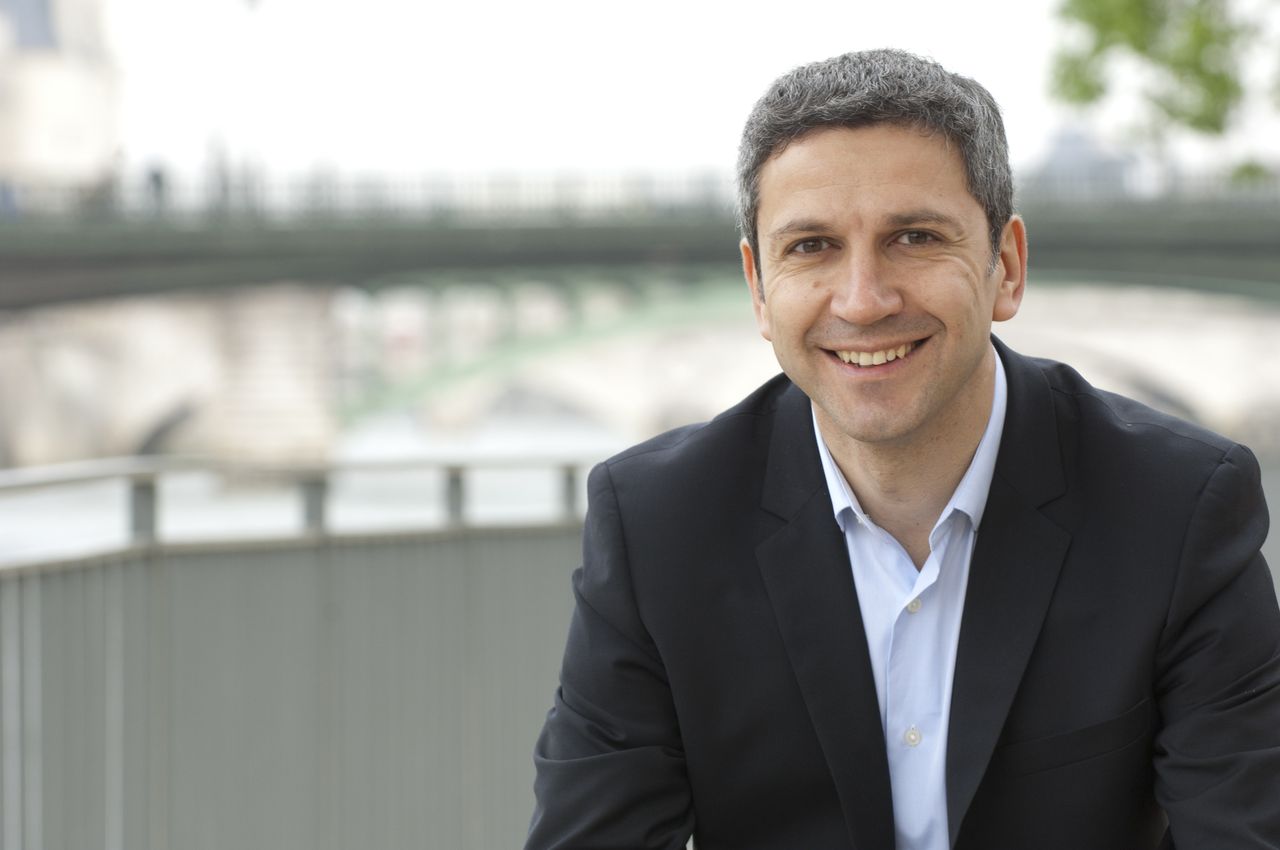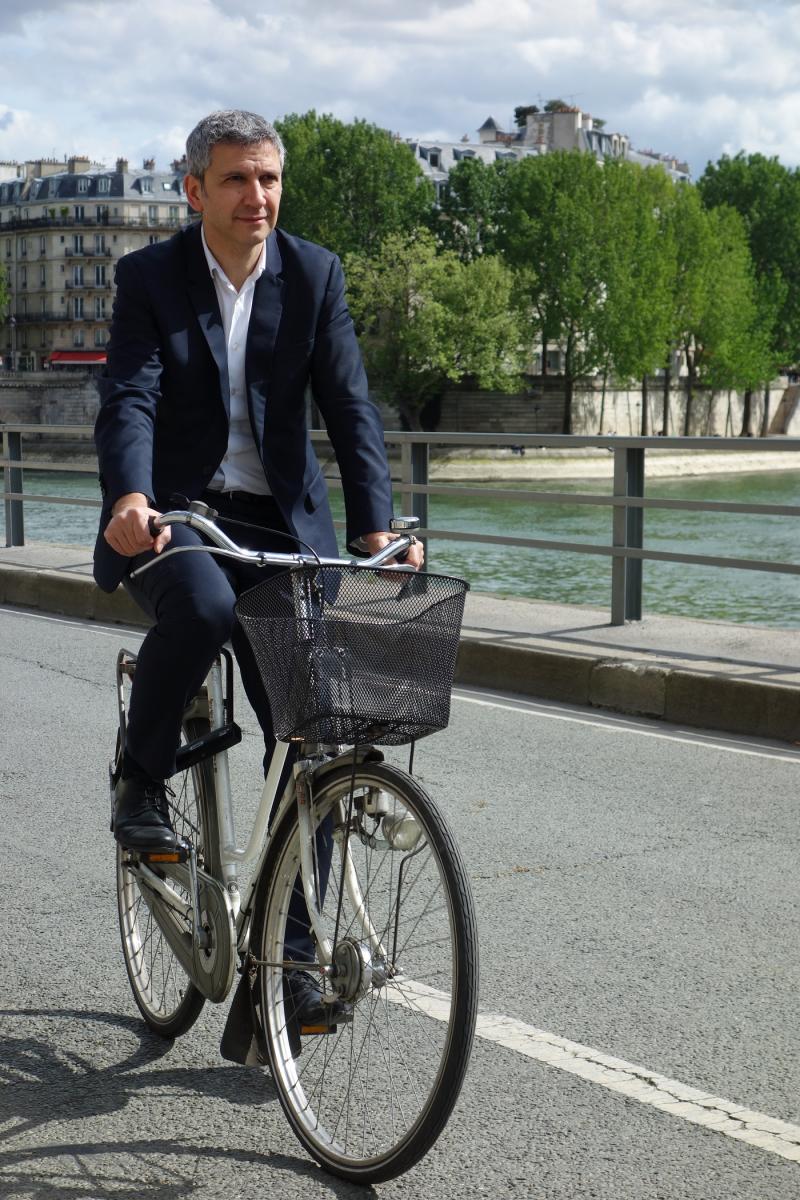
Christophe Najdovski: "Bicycles are a promising and adjustable solution for greener mobility and healthier public spaces”
Interview to Christophe Najdovski, ECF President and Deputy Mayor of Paris for Transportation, Mobility, Roadway and Public Space.
Christophe is a born and bred Parisian, where he has spent over 15 years representing the French Green Party, Europe Écologie Les Verts, in the City Council. Since 2014, he has been the Deputy Mayor of Paris for Transportation, Mobility, Roadway and Public Space. In this role, he actively promotes an environmentalist agenda in mobility policy, in pursuit of reducing atmospheric pollution and greenhouse gas emissions. He also advocates for the restoration of public spaces to pedestrians and cyclists to facilitate better mobility for everyone.
Prior to this role, he served as the Deputy Mayor of the 12th Sector of Paris for Transportation and Mobility, where he oversaw the implementation of a green mobility policy, which included the launch of the bike sharing scheme – Vélib.
ECF: What is your vision for ECF in the future and what’s your opinion on vision 2030?
Christophe Najdovski: I agree 100% with ECF’s vision and its cycling strategy. A Europe of sustainable mobility is indeed a continent where active mobility, walking and biking, are the basis of a mobility system, in close articulation with mass transport. The organisation which stands for this vision, ECF, cannot only be a cyclists’ organization, but a bike organization in all its dimensions. ECF roots its actions in the values of democracy, transparency, responsibility and collaboration, which are in total continuity with the vision 2030 objectives.
 ECF: How do you want to strengthen the role of ECF?
ECF: How do you want to strengthen the role of ECF?
CN: I wish to widen its actions and coordinate all partners involved in mobility by bike. In this project, a global interdisciplinary approach would have a real added value because bicycles embrace all dimensions of life: they are a means of not only locomotion but also leisure, it offers autonomy, and freedom of movement both for children and adults, and it creates social cohesion. There is an industry behind it and a lot of knowledge that allows the implementation of repair and auto-repair workshops. Finally, it’s even used as therapy; some doctors prescribe its practice to cure diseases! That’s why I believe we have a strong interest in having a plurality of perspectives on the ecological, economic, social, public health dimensions all together, to promote a project with a systemic vision.
ECF: What does access to life, the theme of this year’s Velo-city, means to you from your Paris experience?
CN: To me, access to life means having freedom of movement and freedom of decision. Having a bike highly allows that. I was deeply marked by an anecdote that a Cycling Professor said at Velocity 2017 in Arnhem-Nijmegen. He asked us if we knew why Dutch kids are the happiest kids in the world. Well, it is because they all have bikes, and it makes them autonomous and free to meet with their friends whenever they want, without depending on their parents. To me, access to life is notably this liberty, this autonomy, and bikes allow it.
In Paris as in many big cities, we have a problem of urban ghettos: districts that are isolated from the rest of the city, not yet sufficiently linked to urban mass transport facilities. Here, bike is clearly a solution of autonomy: people get access to the city, to new social circles, and it’s also a necessary work tool! Another example is people working at atypical schedules, when public transport is reduced. A solution is commuting by bike. This is a solution for housekeepers as for doctors! And actually, for all journeys bikes are often the quickest and most enjoyable solution.
ECF How was your first experience as ECF President in Velo-city 2018 in Rio?
CN: It was a great honor and a great pleasure to meet with a lot of people, especially with the people of South America because it was the first Velo-City conference on the continent. I was impressed by the fact that the cycling activists from South America were young people and that they are very committed in their action. Here we see the social dimension of cycling, in that it is also an instrument of autonomy and emancipation, in a context where social inequalities are very high. I was also impressed by the fact that cycling has a global dimension in Rio. The new self-service bike system developed - which works very well - was inspired by what was done in Europe, and in particular in Paris, with Vélib.
ECF: Do you have any funny or interesting anecdote from Rio Conference?
CN: I was looking, with another member of the ECF board Damian O’Tuama, to take a shared bike to go from the conference venue to the hotel, approximatively 12km. We searched for bikes for an hour before we could find one each. So we walked a lot before riding a bike! Once on the bike, we took the bike paths, including the very comfortable and very pleasant one that runs along the ocean. Before arriving at the hotel we had to cross a tunnel, where the track is located next to a four-lane road. This shows the efforts that are being made to develop the practice of cycling despite a car culture still being very present.
ECF: How do you think cycling can improve quality of life for present and future citizens?
CN: Cycling is more than a mode of transport. It’s a tool for the autonomy of people. One big lesson I learnt throughout my mandates as Deputy-Mayor is that the bike is for everyone, it is accessible no matter one’s age or social condition. That means that all cities and territories can lead a policy in favour of bikes. It is more than a matter of political will, it is a matter of common sense.
ECF: How do you envisage access to greener mobility and to healthier and wider space in this century’s cities?
CN: Rethinking mobility and public spaces towards conviviality and simplicity means reshaping the current paradigm of urban planning and development: we must commonly identify the roots of what goes wrong and think a long time ahead to imagine the future city we want. We must decide as a society of which urbanity we produce, how, and for what use, and determine what are the necessary conditions and actions to reach it. To me, bicycles are a promising and adjustable solution for greener mobility and healthier public spaces. It is perfectly adapted to urban transport: fast, non-polluting, consuming little space, economical, good for health, etc. It ticks all the right boxes. It is therefore quite pragmatic to develop the bike in town (and elsewhere!).
ECF: What is your personal experience with cycling? What do you enjoy about it? Advantages? When do you cycle?
CN: I started my activism with cycling actions in the 1990s in Paris, to demand cycling facilities. At the time, the city was very badly equipped with cycling facilities. Each month was a rally of several hundred and sometimes even several thousand people. We stopped at crossroads, blocked traffic and lifted our bikes as a sign of resistance. It was part of my first militant commitments.
Today I am fortunate in being elected to be able to implement a public policy in favor of cycling. It's very exciting even though I find that projects are not moving fast enough.
In Paris, I travel by metro and bicycle. The advantage of the bike is that it is fast and pleasant, especially since the banks of the Seine have been open to pedestrians and cyclists.
I also do recreational cycling in the west of France, Vendée and along the river Loire, with beautiful landscapes of groves or the seaside.
ECF: Thank you Christophe. All the best!
News category:
Topics:
Contact the author
Recent news!
Upcoming events
Contact Us
Avenue des Arts, 7-8
Postal address: Rue de la Charité, 22
1210 Brussels, Belgium









